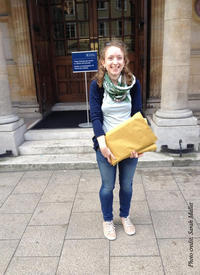It is with very heavy hearts and deep sadness that we share the news that our dear colleague, Lisa Lodwick, passed away on Thursday 3 November, from cancer.
Lisa was a member of the School of Archaeology community for many years, beginning with her undergraduate degree in Archaeology and Anthropology at Hertford College, for which she was awarded a First and the Meyerstein Award for best performance overall. Lisa was also a decorated rower, achieving an Oxford Half Blue. Following a Distinction for the Master’s in Archaeology, Lisa went on to forge a stellar academic career, working with Professor Mark Robinson on the archaeobotany of Silchester for her DPhil at St Cross College. Her first post-doctoral fellowship, with Professor Mike Fulford at the University of Reading, was on the rural settlements of Roman Britain project.
Lisa’s excellence was further recognised when she was awarded a prestigious post-doctoral fellowship at All Soul’s College, Oxford, funding her innovative research into Roman agriculture over the last five years. She was recently appointed to the University Lecturership in Environmental Archaeology at Cambridge, a position Lisa was excited to take up soon.
Beyond her academic research and achievements, Lisa was also a resourceful and resilient supporter of women and of diversity in academia, of early career researchers and of the importance of the open access agenda. In all of these efforts, Lisa worked collaboratively, building many strong links between academic and professional archaeology, Roman and prehistoric archaeology, and Britain and continental Europe.

Lisa’s boundless energy and determination (with a capital ‘D’) made her a powerful force to be reckoned with, but it was her brilliant sense of humour which won people over. Her friends knew better than to call her a Romanist. Lisa was an Iron Age/Romanist (the forward-slash was always explicit), with a penchant for social theory. Committed to helping women in archaeology get recognised, she tirelessly campaigned for better representation in academic conferences and management organisations. It also became her personal mission to create Wikipedia pages for female archaeologists. She was famous for her rigorous sense of organisation, and helped many with her no non-sense advice. Lisa’s Viva Notes are legendary and a generation of graduates at the School have benefitted from them. Her top two tips: make tactical use of toilet breaks! Know the flaws but don’t admit to them!
Despite her young age – she was 34 – Lisa has left a considerable body of innovative and collaborative work that stretches far beyond Oxford and the UK. She will be missed terribly by her friends and colleagues in the School of Archaeology and beyond, for whom she was a constant support and inspiration. What Lisa achieved is phenomenal. Her curiosity, generosity and selflessness, combined with her extraordinary efficiency and practicality, means that her legacy will endure for many more years.
We wish to extend all our sympathies to Lisa’s family, to her husband, Jo, and to her wide network of friends.